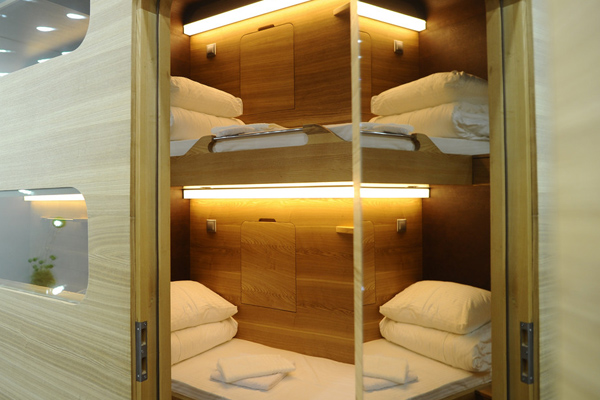Home Inns to launch container hotel unit
 |
|
Wooden sleepboxes for two people are pictured in Sleepbox Hotel Tverskaya in Moscow, on January 28, 2013. [Photo/IC] |
Home Inns and Hotels Management Inc, China's leading budget hotel chain group, said it will launch a new sub-brand, with hotel rooms composed of containers, tents, touring cars and log cabins.
The first such hotel complex, will be built in suburban Shanghai, and the company is currently in the process of site selection.
The group has taken the step in a bid to reduce operational costs. Next spring, the first hotel under the new sub-brand is expected to start operation, said the firm, adding that it costs 150,000 yuan ($21,740) and 45 days to build a container hotel.
The concept of container hotels is not new abroad, but in China it is still in its infancy. These low-cost hotels are expected to be produced on modular batch assembly lines.
"The costs of building such hotel rooms is much lower than building regular hotel rooms. Currently, our research and development work has come to an end. We still need to figure out problems such as sewage and container stacking," said Sun Jian, chief executive of Home Inns.
"So far, about 30 franchisees have already proposed their intention to cooperate with us. The launch of the new brand signals that Home Inns plans to expand to cover casual travel, in addition to business travel."
The hotel group said it initially planned to build mobile hotels to satisfy the different demand in busy and slack seasons, and it later found that mobile hotels can become complexes with more functions, and can even become tourism destinations.
The new complexes will cover accommodation, catering, convenience stores, parking and other comprehensive services such as electronic car rentals, to fulfill the needs of self-driving tourists, Home Inns said.
The pricing of such hotels will be higher than regular budget hotels, as the brand positions itself as a resort and it will be equipped with more comprehensive functions. Still, the price is likely to become lower as the products mature and are standardized.
Dai Bin, director of the China Tourism Academy, a think tank under the China National Tourism Administration, said such a hotel business model is expected to be popularized with the rapid growth of traveling in rural China, the fastest-growing sector of tourism in China.
"The development of rural traveling has driven a huge demand in the rural village home stay markets. But the business is still immature and cannot adequately fulfill demand," he said.
















